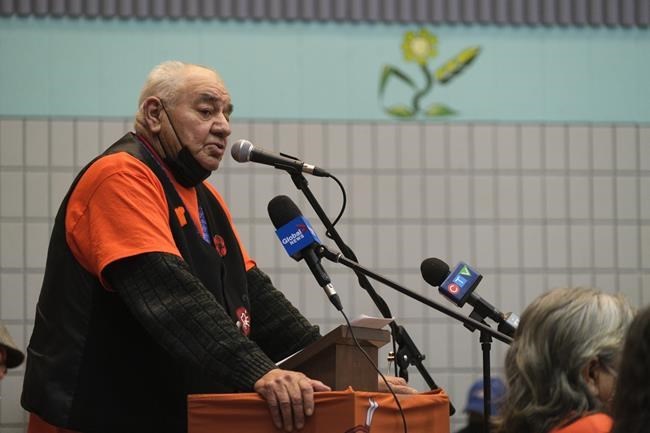
Ted Quewezance announces the discovery of 54 unmarked graves at the Keeseekoose School Gymnasium at Keeseekoose First Nation on Tuesday, Feb. 15, 2022. Residential school survivors say they hope the Pope's visit to Canada next month will include a direct apology for the Roman Catholic Church's role in running the institutions. THE CANADIAN PRESS/Michael Bell
Republished June 01, 2022 - 2:39 PM
Original Publication Date June 01, 2022 - 11:31 AM
WINNIPEG - Residential school survivors say they hope the Pope's visit to Canada next month will include a direct apology for the Roman Catholic Church's role in running the institutions.
Members of the National Indian Residential School Circle of Survivors hosted three days of meetings to discuss what they expect from the visit and reconciliation with the church.
On Wednesday, survivors met with three Roman Catholic bishops to share their wishes.
"I expect the Pope to apologize on behalf of the Catholic Church in the right way," said Ken Young, a former Assembly of First Nations regional chief for Manitoba.
"There has to be some recognition that the (Catholic) Church is responsible for what happened. … The Pope can represent that responsibility in a statement that says that."
Pope Francis is to stop in Alberta, Quebec and Nunavut. The capital cities of Edmonton, Quebec City and Iqaluit are to act as bases for the trip from July 24 to July 29.
He committed to visiting Canada in April after meetings with First Nations, Inuit and Métis groups at the Vatican, where he apologized for the deplorable conduct of church members involved in residential schools.
Indigenous delegates had told the Pope that they expected an apology to be delivered on Canadian soil.
Young said Wednesday the group of survivors drafted wording for an apology and gave it to the bishops.
He added language is important and the apology must include ownership and responsibility on the Catholic Church's behalf for its role in the harmful experiences Indigenous children and their families faced, instead of placing blame on individuals within the church.
"We expect the Pope to do no less and say no less," Young said.
An estimated 150,000 Indigenous children were forced to attend residential schools in Canada and more than 60 per cent of the schools were run by the Catholic Church.
Archbishop Richard Smith of Edmonton, who spoke with survivors Wednesday, said the Pope and the Vatican are open to hearing from survivors.
"He'll do the right thing. He'll say the right thing, whatever that ends up being, because he really wants this to be a step forward in the whole healing process," Smith said. "How he says it is the prevailing, outstanding issue."
Work is still ongoing to find the wording that will "land well for everybody," he said.
The group of residential school survivors also spoke about their disappointment at being excluded from the trip planning. They want the papal visit expanded to more locations beyond the scheduled stops.
The Canadian Conference of Catholic Bishops previously said the Vatican selected the three cities based on the length of the trip, the vast size of Canada and the health of the 85-year-old pontiff.
Smith doesn't expect changes will be made to the trip.
He said the bishops of Canada are committed to working with survivors and all Indigenous people during and after the visit.
Ted Quewezance, interim chair of the survivors' group and the former chief of Keeseekoose First Nation, said this work is already happening in different regions.
"The bishops are working with survivors. The big priority is how do we get our survivors to Edmonton," he said Wednesday.
The group and the Catholic Church are working to get survivors to Alberta and are looking at chartering busses, Young said.
He said he left the meeting with an open mind.
"I have a positive feeling that we're going to get the work done and that the Catholic Church is going to be there supporting us."
The Indian Residential Schools Resolution Health Support Program has a hotline to help residential school survivors and their relatives suffering trauma invoked by the recall of past abuse. The number is 1-866-925-4419.
This report by The Canadian Press was first published June 1, 2022.
News from © The Canadian Press, 2022